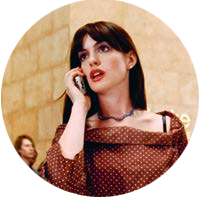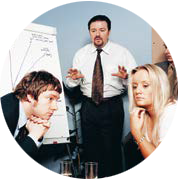Smarter Worklife
Offices on the silver screen
From the cult series The Office to the immortal classic Wall Street – what goes on in offices in popular culture? Here are Smarter Worklife’s favorites, which all portray to some degree the thing we’re all passionate about—the workplace.

Wall Street (1987)
Most people are familiar with the quote “Greed is good.” Once  again, New York is the scene of office drama—this time behind the closed doors of the financial world. The young, hot-headed stockbroker Bud Fox (Charlie Sheen) is ready to do anything to claw his way to the top. His mentor is the legendary, uncompromising Gordon Gekko (Michael Douglas). We soon see that what happens behind the closed doors of the financial world is not within the framework of the law—and the high-stakes game soon becomes life-or-death.
again, New York is the scene of office drama—this time behind the closed doors of the financial world. The young, hot-headed stockbroker Bud Fox (Charlie Sheen) is ready to do anything to claw his way to the top. His mentor is the legendary, uncompromising Gordon Gekko (Michael Douglas). We soon see that what happens behind the closed doors of the financial world is not within the framework of the law—and the high-stakes game soon becomes life-or-death.
Wall Street reflected the money-hungry 1980s and established the image of Wall Street as the mecca of ultra-capitalism, full of greedy, uncompromising villains in suits, making their riches off hard-working everyday people.
The Devil Wears Prada (1996)
Here, too, we are taken to the city of corporate ladder climbing and sharp elbows, New York. “Andy” (Anne Hathaway) wants to be a journalist at the market-leading magazine Runway (read: Vogue). She gets a step closer to her goal when she becomes an assistant to the immortal editor Miranda Priestley (Meryl Streep), who turns out to be the devil herself, demanding 100% service every hour of the day. This results in Andy sacrificing love and friendship for the job—but is it worth it?
sharp elbows, New York. “Andy” (Anne Hathaway) wants to be a journalist at the market-leading magazine Runway (read: Vogue). She gets a step closer to her goal when she becomes an assistant to the immortal editor Miranda Priestley (Meryl Streep), who turns out to be the devil herself, demanding 100% service every hour of the day. This results in Andy sacrificing love and friendship for the job—but is it worth it?
The movie was an eye-opener for many, and created discussions about leadership, toxic workplaces and unhealthy working conditions.
The Severance (2022)
Separating work and leisure can be challenging. But this acclaimed,  dystopian TV series, directed by Ben Stiller, which largely takes place in an office, takes this to the extreme. Through a surgical procedure, where a chip is implanted in the brain, the employee’s memory is completely split between private life and work. When the main character Mark (Adam Scott) goes up in the work elevator, he forgets all his feelings and who he is on the outside. And vice versa when he clocks out. It is only when an old colleague seeks him out outside of work and sends hidden messages that Mark begins to question what is actually going on in the company Lumon Industries’ sterile, creepy corridors...
dystopian TV series, directed by Ben Stiller, which largely takes place in an office, takes this to the extreme. Through a surgical procedure, where a chip is implanted in the brain, the employee’s memory is completely split between private life and work. When the main character Mark (Adam Scott) goes up in the work elevator, he forgets all his feelings and who he is on the outside. And vice versa when he clocks out. It is only when an old colleague seeks him out outside of work and sends hidden messages that Mark begins to question what is actually going on in the company Lumon Industries’ sterile, creepy corridors...
The Office UK (2001)
”I suppose I’ve created an atmosphere where I’m a friend first and boss second. Probably an entertainer third.” Is the series’ main character David Brent, masterfully portrayed by Ricky Gervais, the world’s worst or best boss? If you ask him, the answer is unequivocally the best. This cult mockumentary (fictional documentary) series takes place in a dull, grey suburban office in Slough outside London, and deals with everything from forbidden love between colleagues to a tactless boss who fires employees as a joke. The Office changed the entire genre of comedy series, demonstrating that it was at least as funny, if not more, without obvious jokes, laugh tracks or a studio audience.
David Brent, masterfully portrayed by Ricky Gervais, the world’s worst or best boss? If you ask him, the answer is unequivocally the best. This cult mockumentary (fictional documentary) series takes place in a dull, grey suburban office in Slough outside London, and deals with everything from forbidden love between colleagues to a tactless boss who fires employees as a joke. The Office changed the entire genre of comedy series, demonstrating that it was at least as funny, if not more, without obvious jokes, laugh tracks or a studio audience.
"Take, for example, 'The Devil Wears Prada' where there is a clear tyrant who you either break off or rebel against."
Hey there...
... Caroline Hainer, author, cultural journalist and film critic.
What is the general image of the office in popular culture?
"In general, you can say that the office has been used in two ways. Either as a backdrop for a psychological narrative about human nature, group dynamics and hierarchies, and the boredom of conformity. Take, for example, The Devil Wears Prada, where there is a clear tyrant who you either break off or rebel against. Or the office is used as a way to tell about the society we live in, about capitalism and the little person against the big market forces. Oliver Stone's Wall Street, for example. There, it is the stockbrokers who fight with each other for their survival, while the super-capitalist Gordon Gekko rules the financial world from his lavish office high up in the skyscraper.
Why does the office work so well for drama?
"On the one hand, there are built-in hierarchies that are grateful to create drama around. Are you someone who joins the ranks or are you a rebel? On the one hand, the office is an excellent mirror of society at large, where people who want to improve and change stand in contrast to silent collaborators who just want to keep going. And somewhere in between, there is the opportunity to see that we are all human beings with dreams, sorrows and happiness.

Caroline Hainer, author, cultural journalist and film critic.


